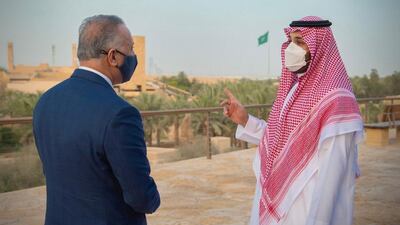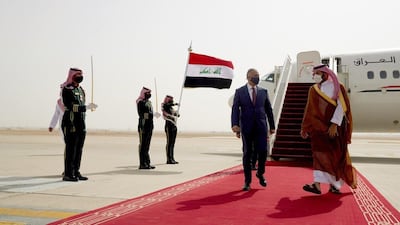Saudi Crown Prince Mohammed bin Salman welcomed Iraqi Prime Minister Mustafa Al Kadhimi with a full military honour guard on the tarmac in Riyadh on Wednesday at the start of an official visit to the kingdom aimed at boosting ties.
"Today, we embark on a visit to the kingdom of Saudi Arabia to strengthen our bilateral ties and enhance regional co-operation," Mr Al Kadhimi said on Twitter.
"We will work on serving our peoples' interests, achieving stability and advancing developmental values based on what binds us."
Saudi King Salman and Crown Prince Mohammed bin Salman said security was an important issue for discussion, the Saudi Press Agency reported.
"The kingdom is keen to support Iraq's efforts to confront extremism and combat terrorism, and stresses the need to respect its sovereignty and territorial integrity and to stop foreign interference, and works on this basis to strengthen bilateral relations in all fields," Spa reported.
Saudi Arabia's ambassador to Iraq, Abdul Aziz Al Shammari, told the daily Okaz on Tuesday that Mr Al Kadhimi would discuss "political, security and economic issues".
Mr Al Shammari did not give more details but said the visit "comes at an important time”.
Mr Al Kadhimi's adviser, Hussein Allawi, told The National that leaders of the two countries would discuss "the conflicts in the region and exchange opinions about them".
But Mr Allawi gave no details on any proposal to resolve regional conflict.
Talks will also focus on enhancing trade, investment by Saudi companies in Iraq and the possibility of opening a new border crossing in addition to the existing crossing at Arar.
The two sides will also discuss co-ordinating stances within Opec and its allies, known as Opec+, to prop up oil prices, Mr Allawi said.
The meeting was originally scheduled in July to be the first state visit for Mr Al Kadhimi, two months after taking office.
But it was postponed when King Salman was admitted to hospital.
After Saddam Hussein's invasion of Kuwait in 1990, the kingdom, along with many countries in the region and the wider world, severed ties with Iraq.
Unlike other Arab countries, relations did not resume after the US-led invasion that toppled Saddam.
Saudi Arabia viewed subsequent Iran-backed Iraqi governments with increasing suspicion.
To counter Iran’s growing influence, the US urged the kingdom to forge ties with Iraq, resulting in Saudi Arabia reopening its embassy in Baghdad.
Since then, the two neighbours have exchanged visits, including trips by senior officials to enhance co-operation in various fields, and signed several agreements.
In 2017, they set up the Saudi-Iraqi Co-ordination Council on Economic, Trade, Investment and Relief matters.
In November, they reopened the Iraqi-Saudi Arar crossing, which was hailed by the two countries as a critical “investment gateway”.
_______________
























